Former senator Babafemi Ojudu has revealed how President Bola Tinubu secretly recorded a Jewish lawyer detailing the massive looting orchestrated by Nigeria’s former military ruler, Sani Abacha, during the 1990s.
Ojudu shared this account in an interview with Edmund Obilo while discussing his book, Adventures of a Guerrilla Journalist.
Abacha, who ruled Nigeria from 1993 to 1998, reportedly siphoned about $5 billion into foreign accounts in the United States, United Kingdom, and Switzerland. For years, the Nigerian government has been recovering these stolen funds.
Recounting his experience in exile, Ojudu explained that Tinubu introduced him to the lawyer in the UK. The lawyer promised to provide vital information about Abacha’s corruption and those complicit in the looting.
In a surprising twist, Tinubu deployed a cunning strategy to ensure their conversation was recorded. According to Ojudu:
“I was excited as a newsman. We went there and sat before the lawyer. He (the lawyer) kept reeling out how Abacha was stealing, and who was helping him. The name that was constantly mentioned was the Chagoury brothers. I was so excited but felt bad because I couldn’t write or take notes. I kept trying to memorize whatever I could.”
Midway through the discussion, Tinubu excused himself, claiming he needed to use the bathroom. Ojudu recounted:
“That time I went to the bathroom, I went to change the recording from side one to side two. That is why I flushed the toilet, so the man would not know I was changing the tape.”
Ojudu praised Tinubu’s strategic thinking:
“He (Tinubu) is a strategist. He does what he has to do to get what he has to get. I love to work with people like that, who will always find a solution.”
However, Tinubu initially attempted to stop the story from being published. Ojudu recounted how he secretly retrieved the tape:
“We got home and ate. He (Tinubu) was on the couch and slept off. I rifled through him, took the tape, and then woke him and said I was leaving.
“About 8pm, he called me and said: ‘Femi, where are you? I can’t find that tape.’ I told him it was with me. He said: ‘What are you doing with it?’ I replied: ‘I am going home tomorrow to publish it.’ He warned me, ‘If you publish it, you are dead.’ I said: ‘I will publish it and let them kill me.’”
Ojudu returned to Nigeria, played the tape for his staff, assigned them tasks to verify details, and published the story.
“It was a story that shook Abacha,” Ojudu said.
This bold journalistic feat highlights Tinubu’s calculated methods and Ojudu’s daring commitment to exposing corruption.


